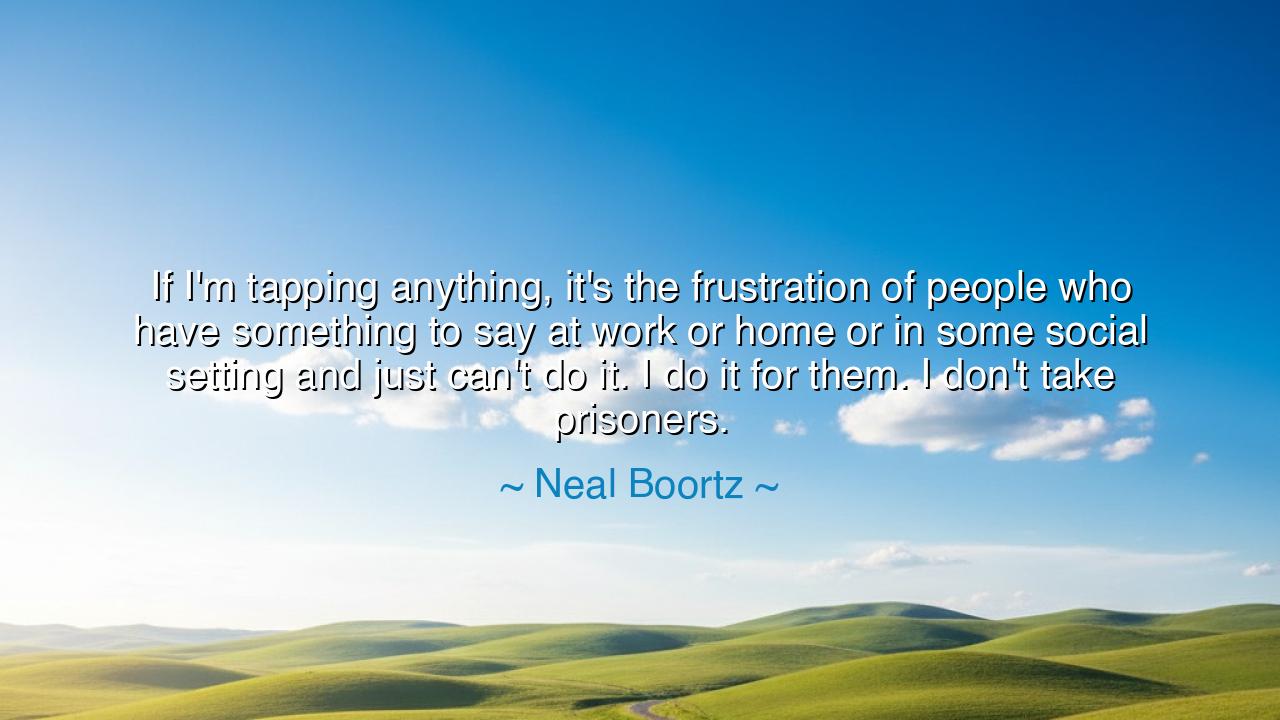
If I'm tapping anything, it's the frustration of people who have
If I'm tapping anything, it's the frustration of people who have something to say at work or home or in some social setting and just can't do it. I do it for them. I don't take prisoners.






In the fierce and unflinching words of Neal Boortz, the American radio host known for his sharp tongue and sharper wit, we hear the cry of a man who speaks not only for himself, but for the voiceless multitude: “If I’m tapping anything, it’s the frustration of people who have something to say at work or home or in some social setting and just can’t do it. I do it for them. I don’t take prisoners.” These words ring with the power of ancient truth — the eternal struggle between silence and speech, between fear and freedom. Boortz stands here as a modern herald, declaring that words, when spoken with conviction, can shake the very foundations of complacency. He is the mouthpiece of the unspoken — a warrior of language in an age of restraint.
To understand the spirit of his words, one must understand the nature of frustration — that silent fire that burns in those who see injustice or absurdity yet dare not speak. Across generations, men and women have swallowed their truths to preserve peace, to keep their positions, to avoid the wrath of those in power. And yet, in every age, there arise those who cannot remain silent — the prophets, the poets, the orators — who give voice to the buried emotions of the people. Boortz’s words echo this ancient calling. He does not merely speak; he channels the unspoken. In doing so, he fulfills the timeless role of the truth-teller — the one who risks isolation so that others may feel heard.
In the old days, such figures were known as heralds or seers, messengers of divine or moral revelation. The Hebrew prophets, like Jeremiah or Amos, were reviled for speaking hard truths to kings and crowds who preferred comfort to conscience. “They hate him who reproves in the gate,” wrote Amos, “and they abhor him who speaks the truth.” Yet these prophets did not relent — for they understood, as Boortz does, that truth unspoken festers. To say what others cannot is not arrogance, but duty — a burden carried by those who are willing to stand alone.
When Boortz declares, “I don’t take prisoners,” he speaks not of cruelty, but of fearlessness. He means that when truth must be spoken, it should not be softened to please, nor restrained to comfort. The sword of speech must strike cleanly, or not at all. This sentiment is ancient and universal. Consider Diogenes the Cynic, the ragged philosopher of Athens, who wandered the streets with a lantern in daylight, saying he searched for an honest man. He mocked emperors, scorned hypocrisy, and spoke truths so blunt that the powerful trembled and the timid cheered. He, too, “took no prisoners.” His words were his weapon, and like Boortz, he used them to defend honesty in a world addicted to polite deceit.
The origin of Boortz’s quote lies in the world of talk radio — that modern agora where opinion, outrage, and truth collide in a public arena. As a broadcaster, Boortz built his legacy on voicing what others dared not say — the uncomfortable, the controversial, the raw. His listeners found in him a vessel for their own suppressed emotions — the things they muttered under their breath at dinner tables, the arguments they dared not make in meetings or families. His power, then, was not merely his voice, but his courage. For in giving sound to silence, he reminded millions that truth, though dangerous, is still possible.
Yet, let us look deeper: his words are not merely about speech, but about liberation. To express one’s truth — even when unpopular — is to reclaim one’s dignity. To stay silent in fear is to yield the soul to conformity. The ancients taught that speech was a gift of the gods — that logos, the power of word and reason, was what separated humankind from beasts. To speak truth, therefore, is not a social act, but a sacred one. When Boortz speaks of “doing it for them,” he becomes a vessel for this divine inheritance — a reminder that each person has the power, and the responsibility, to use their voice for what is right.
Let this be the lesson: silence is safe, but it is also surrender. If you see wrong and say nothing, you consent to its reign. If you feel passion but hide it, your spirit withers. Every generation needs its speakers — not only on the airwaves, but in homes, classrooms, and halls of power. And every soul must learn to be its own advocate, its own Boortz, in moments that matter.
Action to take: find your truth, and give it voice. Speak with courage when the moment calls for it — not with cruelty, but with conviction. Learn from Neal Boortz that words can be both mirror and sword — reflecting the soul and cutting through deceit. And when you speak, do not fear the judgment of the crowd. For though truth may wound for a moment, it heals the heart of a people in the end. To speak freely is to live freely — and those who live freely will always be the true heirs of wisdom, in any age.






AAdministratorAdministrator
Welcome, honored guests. Please leave a comment, we will respond soon